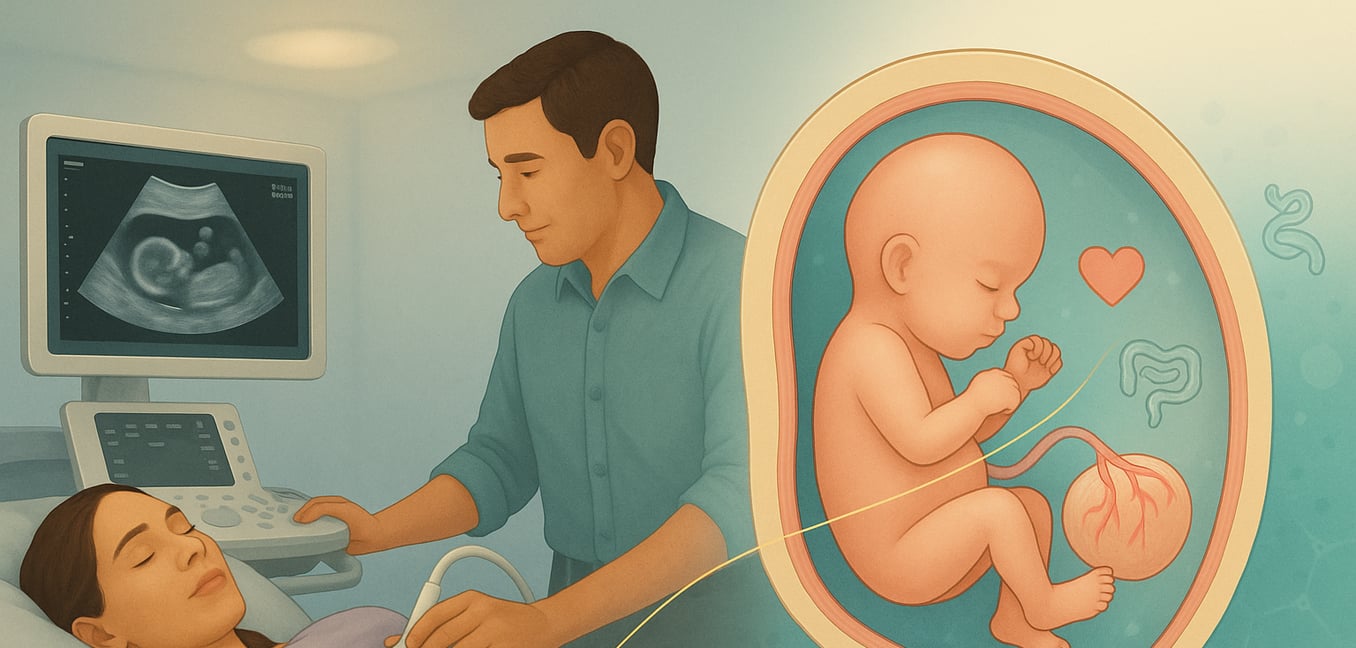Understanding the Diagnosis
An omphalocele is a birth defect of the abdominal wall where a baby's organs, such as the liver and intestines, remain outside the body in a protective sac. A prenatal diagnosis, typically made via ultrasound, is the first step in a journey that is as much emotional as it is medical. The size of the omphalocele and the presence of other health issues are key factors that shape the path ahead for the family.
Up to 80% of babies with an omphalocele have other conditions, most commonly heart defects. This link is a major source of parental anxiety, as it significantly impacts the baby's prognosis and the complexity of their care. Understanding this medical reality is crucial, as it forms the backdrop for the profound psychological effects that families experience from the moment of diagnosis.
The Weight of the Diagnosis: Initial Emotional Reactions
When an omphalocele diagnosis enters the picture, the idealized vision of parenthood is abruptly replaced by a whirlwind of complex emotions. This moment marks the beginning of an intense emotional journey that runs parallel to the medical one.
- Initial Shock and Disbelief: The news is often delivered without warning, leaving parents feeling stunned. Whether detected during a routine ultrasound or at birth, the reality of the diagnosis can shatter the image of the "healthy" baby they had envisioned, making it hard to process.
- Pervasive Fear and Uncertainty: A profound sense of fear often takes hold as parents face terrifying questions about their child’s survival and future. This anxiety is magnified by the potential for other health complications, creating a heavy cloud of uncertainty.
- Feelings of Guilt and a Search for Answers: It is common for parents to feel a deep sense of responsibility, replaying their pregnancy to find a cause for a condition that is fundamentally uncontrollable. These feelings of self-blame are a natural, though painful, part of making sense of the diagnosis.
- Grieving the Expected Journey: Parents experience a form of grief for the experience they thought they would have. The anticipated joy of bringing a newborn home is replaced by life in a neonatal intensive care unit (NICU), a significant and often unspoken loss.
While these initial feelings are shared, fathers often navigate a unique set of pressures that warrant special consideration.
A Father's Fear: The Paternal Psychological Journey
While the mother's experience is often the focus of prenatal care, the psychological impact on an expectant father is equally profound. The diagnosis of omphalocele thrusts fathers into a role filled with unique pressures, fundamentally altering their journey to parenthood.
The Acute Stress Response
Research shows that fathers facing this diagnosis experience significantly elevated levels of anxiety, depressive symptoms, and post-traumatic stress, particularly immediately following the news. This period is often marked by intrusive thoughts about the baby’s health and a state of hypervigilance as they grapple with the sudden loss of the expected "healthy" pregnancy narrative.
The Pressure to Be the "Rock"
Many fathers feel an immense pressure to be the stoic supporter for their partner and family, which can lead them to suppress their own fear and grief. This perceived duty to remain strong often prevents them from seeking support, isolating them and putting them at greater risk for persistent psychological difficulties.
A Non-Linear Emotional Path
A father's emotional journey is rarely a straight line. While the initial shock may lessen as the family gathers information, stress often resurges with renewed intensity as the birth approaches. Studies indicate a notable increase in depressive symptoms in fathers during the third trimester, tied to the impending reality of birth and the transition to life in the NICU.
Facing the Future: Long-Term Anxieties and Stressors
As the initial crisis of diagnosis and birth subsides, families enter a new phase defined by long-term anxieties and the chronic stress of raising a child with complex medical needs. The path forward is a winding road with persistent worries.
- Developmental Uncertainties: A primary source of long-term anxiety is the child's development. Parents may worry intensely about their child meeting milestones, fearing potential learning or physical challenges. This hyper-vigilance can be emotionally exhausting and make it difficult to celebrate their child's unique progress.
- The Marathon of Medical Care: The journey rarely ends after the initial surgery. Families often face a long road of specialist appointments, follow-up procedures, and the lingering fear of re-hospitalization, which creates a chronic undercurrent of stress.
- Strain on Family Resources: The immense focus required to care for a child with an omphalocele can test the entire family unit. Financial burdens, time away from work, and the challenge of balancing the needs of other children can lead to feelings of isolation and strain on parental relationships.
Preparing for the Path Ahead: The Role of Diagnosis and Support
Facing an omphalocele diagnosis is daunting, but knowledge and support are powerful tools that help families transform fear into proactive preparation.
- Harnessing the Power of Prenatal Diagnosis: An early, thorough diagnosis is vital for a family’s emotional readiness. It provides a clearer picture of the baby’s condition, giving parents time to process information and make informed decisions, like planning delivery at a specialized hospital (often called a tertiary care center) with a NICU and pediatric surgical teams.
- Assembling a Multidisciplinary Care Team: A coordinated team of specialists in fetal medicine, pediatric surgery, cardiology, and neonatology provides a critical safety net. Knowing this expert team is collaborating on a unified plan can alleviate the overwhelming burden on parents and offer a central source for guidance.
- Finding Strength in Peer Support: Connecting with other families who have navigated an omphalocele diagnosis can combat profound isolation. Peer support groups offer a safe space to share fears, exchange practical advice, and celebrate small victories with people who truly understand, providing tangible hope.
- Prioritizing Parental Mental Health: Caring for a child with complex medical needs requires immense emotional resilience. Hospitals often have social workers and psychologists who can provide parents with coping strategies to manage anxiety and grief, enabling them to be more present and effective caregivers.










